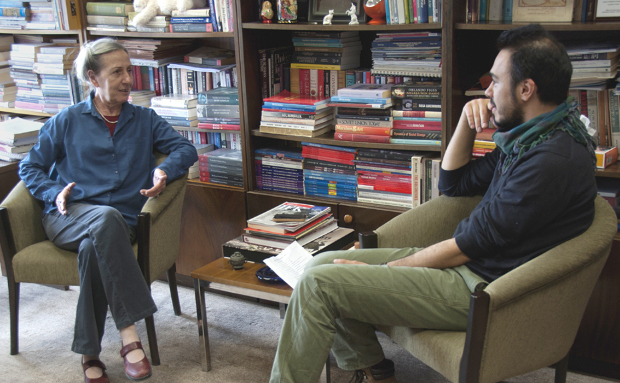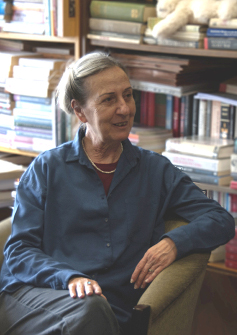BY ALP RODOPLU (HIST/MA)

Photographs and transcription by Ada Çakar (GRA/MA)
Alp Rodoplu: Do you enjoy writing?
Nur Bilge Criss: I enjoy writing tremendously. It’s not something you can do without liking it, and it shows when a piece of writing is produced with a kind of passion.
AR: But it’s not an easy task? It’s often frustrating, even painful at times.
NBC: It depends on what you are writing about. The desire to have a say-so on an issue, and not necessarily in your own intimate field, is a powerful motivation. In my case, there is also the motivation to dig into the past so that old knowledge is updated with new knowledge; and succeeding at this is a wonderful feeling.
AR: Where do you normally write? Here, in your office?
NBC: I prefer writing at home. My little library is a very intimate place. It’s my place. Here I mostly do administrative work or type up what I wrote at home on the computer. It might surprise you as a young person, but I don’t have a computer at home—so I’m free. Here in my office, I can’t be alone because students, calls, e-mails come. And I still like my pencils and paper—I like the smell, I like the aura, the whole thing.
 AR: Like a sanctuary almost?
AR: Like a sanctuary almost?
NBC: Yes, exactly.
AR: Just out of curiosity—is your study the room looking toward the road? The room next to the one with the stained glass windows? As you may recall, we were neighbors, and I always wondered—that room, even to a child, had an almost mystical energy one can feel even from the outside.
NBC: Yes, it’s the one facing the tennis courts, with those two beautiful trees in front of the window.
AR: Then I can say that you mostly work at night?
NBC: Yes, mostly at night and on weekends.
AR: Do you know exactly what you will say when you sit down to write? Or is the writing itself a way of exploring and experimenting?
NBC: Well, both. Before I sit down to write, I have already thought about it for days or even months, and at times years. It stays there in your brain, in your own computer. Then you feel it is time to put it down on paper, which I suppose is what people call inspiration.
AR: But your field of IR or history has a unique rhetoric, which must influence the time you spend on writing and perhaps makes the writing process more challenging than it is for more technical fields where writing is rendered into a mechanical procedure.
NBC: That is a challenge that I like. I have a master’s degree in linguistics, and so language—its power, how and where it is used—is something I am very interested in. I have a great friend, which helps me—and I say “which” because it is not alive—the New York Review of Books. There are very fine reviews and articles relevant to my field in this publication, which uses a very clear but sophisticated language. And I make a list of the words I do not know, and then I look them up in my dictionary—you know, page by page, and I only feel comfortable with my old Oxford Dictionary. When you are not a native speaker, there is no end to learning a language.
AR: A further question about language, then. You write both in Turkish and in English—what kind of difficulties have you encountered writing in your native tongue and then in a second language?
NBC: Just because it is your native tongue does not guarantee that you write well in it. And writing is not like speaking, which is easy. When my mother used to help me smooth out my Turkish, she helped me come back to writing in Turkish. In any case, the more you write, the better you get.
AR: Most people I have spoken to particularly like English. They find it easier to communicate in English. Norman Stone said this, and then Sandrine Berges confirmed it, and her native tongue is French. What would you say to this? Would you agree?
NBC: Well, it depends on who is doing the writing. If you are educated the way I was, to “write to communicate,” then you have to be clear and get your message across; you do not hide or imply things. When you apply the same principle in Turkish, I think it comes out all right. But it also has something to do with the reader—it takes two to tango—and there is nothing you can do if your reader does not read well. But language-wise—structurally—I don’t quite agree.
AR: Earlier, you mentioned reviews. How is your relationship with them? Do you like writing book reviews?
NBC: Stanford Shaw once told me, “Reviews are the best way to make enemies, or friends.” I try to be fair, and I suppose I have been successful, because I do not know of any enemies yet. But if I cannot write a positive review with constructive criticism, I just refuse to write it.
AR: How about books and articles? Are there differences in terms of the writing processes that go into them?
NBC: A book is more challenging. Keeping your focus on your major theme can be difficult. And the length is also a deceptive measure. Moreover, you need to present new ideas or new information, but you have to be careful in the way you use them. Using them when they do not fit with the framework is like imposing a theory on an issue simply to prove the theory. So writing a book is a serious thing. That is why I am prejudiced toward books that are written immediately after events like the Arab Spring. One month after it broke out, books began appearing on the Arab Spring—mostly by journalistic people, but you are still talking about a book.
AR: How about articles?
NBC: The same challenges are also there for articles, but they are difficult in other ways: limited space and time. For instance, you cannot send an article for publication in the summertime, because everybody is on vacation. So there are certain times you should be doing this. And then, you also have the problem of saying something in a smaller space.
AR: You probably don’t think about any of these things when you write. Or do you?
NBC: No, it was after I saw your pieces that I actually started to think about them. When you first asked me to participate in this project, I thought, “Oh, all right, Alp is asking pretty straightforward, easy questions.” Then I said to myself, “Wait a minute, these questions are not easy at all! You had better start thinking about them.”
AR: I personally find writing a lot of fun, but at the moment I am still learning, which is why I regularly think about how to write. Most of the time it is almost painful, like giving birth.
NBC: It is. These are our children, after all. I have a student who is extremely bright, but he hastens into things. Last semester, he shocked me with his first sentence: seven lines long, with at least fourteen ideas. He just could not break it up. I broke it up for him, and then I asked, not wanting to misrepresent or misquote him, “Is this what you wanted to say?” He said, “Yes, hocam!” “All right, then, cool it, slow down.”
AR: But don’t you ever get stuck when you are writing? I regularly do, because writing is a significant part of my thinking, which is hardly very smooth. For example, is there anything you do to get started, which is often difficult?
NBC: Once I start writing, after that first sentence, it flows. I just let it come naturally. I cannot be bothered to force myself—I am too lazy for that—and I do not want to dwell on the negative. Even at the age I am now, I still think Bambi’s mother did not die in the fire, and that the story ended positively. I still think that it was a little girl who plugged the dike with her finger and saved the city from being flooded. “But that was a little boy!” says my husband, and I say, “No, it was a little girl!” I identify myself with her.
AR: Lastly, is there anything you wish to say to aspiring Bilkent writers?
NBC: Let me tell you something I learned from my husband, who is a scientist, a molecular biologist. Having trouble writing an abstract, I once complained, “Why do I have to write an abstract?” He said, “Because if you cannot tell your story in three hundred words, then you don’t know anything about it.” “What do you mean, I don’t know anything about it?!” was my reaction, but he was right. Like he said: “It is as simple as that.” And I always bear that in mind.
